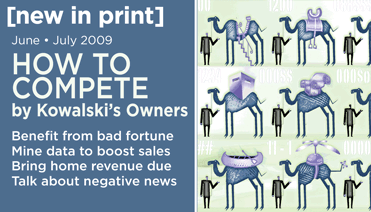Tanner Montague came to town from Seattle having never owned his own music venue before. He’s a musician himself, so he has a pretty good sense of good music, but he also wandered into a crowded music scene filled with concert venues large and small.But the owner of Green Room thinks he found a void in the market. It’s lacking, he says, in places serving between 200 and 500 people, a sweet spot he thinks could be a draw for both some national acts not quite big enough yet for arena gigs and local acts looking for a launching pad.“I felt that size would do well in the city to offer more options,” he says. “My goal was to A, bring another option for national acts but then, B, have a great spot for local bands to start.”Right or wrong, something seems to be working, he says. He’s got a full calendar of concerts booked out several months. How did he, as a newcomer to the market in an industry filled with competition, get the attention of the local concertgoer?
Education
Convicted financier says
line can be crossed easily
when colleagues talk
The driving force was a big ego.
So said former financier George Kline of his insider trading and other financial crimes at White Collar Crime and Personal Responsibility, a June program sponsored by the University of St. Thomas’ law school and Center for Ethical Business Cultures.
The modus operandi, he said, was gossip. “It’s one thing to say we’re having a real good quarter at the company. It’s another to say we’re having a real good quarter, and the earnings are going to be X and they’re going to exceed expectations.”
More than 200 people turned out to listen to Kline, former Minneapolis City Council member Brian Herron, and other white-collar criminals recount their misdeeds and explain why they committed them. The large turnout required a move of the event from St. Thomas’s downtown Minneapolis campus to First Baptist Church across the street. None of the presenters was paid.
Kline, who is serving a 54-month sentence (reduced from 78 months the morning of the program) in a Duluth federal prison, was politely applauded before and after his 30-minute presentation. A former college basketball star, Kline towered over the agents who flanked him, yet his intimidating stature was muted by his hunched shoulders and tired voice. He wore his prison uniform imprinted with his prison number.
“I’ve managed to go from the very top to the very bottom,” said Kline, who told how FBI agents had arrived at his door with a subpoena, and then brought him to the FBI building to fingerprint him and take mug shots. He was later asked to produce all of his financial records dating back many years. “The federal resources that are brought to bear on violators are overwhelming. There was nothing that was not turned over,” he said.
Kline said he takes responsibility for his crimes. What he once perceived as a victimless crime he now sees as “taking a brick out of the foundation,” causing investors to lose faith in the market.
But many violators don’t realize the line they’ve crossed. Casual conversation between friends and colleagues is the biggest breeding ground for impropriety, he said.
“Boards should sit down on a regular basis and talk about ethics; talk to each other about just what they’re talking about.” Also, the FBI’s methods of detection need to be better explained to those who think they’re invulnerable. “The thoroughness of pulling up and cross-referencing of information — that’s all those people do.”
If the stick doesn’t encourage strong ethics, perhaps the carrot will, added a University of St. Thomas speaker after Kline’s presentation. In his concluding remarks, Ron James, CEO of the Center for Ethical Business Cultures, said companies that make ethics an integral part of their culture outperform companies that don’t: Revenue grows four times as fast, stock prices increase 12 times as fast, according to a Harvard study.
Ron James, University of St. Thomas Center for Ethical Business Cultures: 651.962.4123; rjames@stthomas.edu
Informer Articles
Class in session
Flush from Lighthouse1 sale, '07 Upsize Business Builder starts Storyworks Media
"Consumers out there are really confused," says Jeff Fritz, about employees who more and more often these days must choose a so-called consumer-driven health plan. "We in the industry think we have the latest and greatest products and services, but consumers are just dumbfounded.
New name, shift to vein care help Kass Clinics build
New name, shift to vein care help Kass Clinics build





